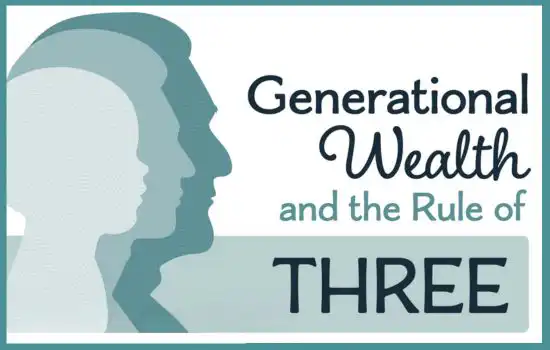
What is generational wealth? Generational wealth is a relatively new term though the principles have been around for much longer. Generational wealth refers to assets passed from one generation of a family to the next, whether money, stocks, real estate, private business, or alternative investments. While the term is new, the concept has existed for centuries, if not millennia. Proverbs 13:22 notes “a good man leaveth an inheritance to his children’s children.” Job 42:15 tells us Job gave an “inheritance among their brethren.”
I also believe generational wealth should include more than money. Our greatest blessing is our faith in Christ, and passing it on to the next generation is more important than any financial asset. Yet the process involved is closely related.
First, decide how you will create, build, or acquire assets to pass to the next generation. Are you saving for retirement, amassing real estate holdings, or building a business? You must start the wealth creation. Individuals who want to pass on generational wealth start well before it is time to pass it on. In our walk with Christ, if we don’t have and build a personal relationship with Him, we have nothing to pass on.
As your assets grow and you execute your strategy, it is important to include the next generation to whom you will leave those assets. This is where the three-generation rule comes into play. An old maxim says wealth does not last beyond three generations. A study by the Williams Group conducted over a 20-year span, involving 3,200 families, found that seven in ten families end up losing their fortunes by the second generation,
and nine in ten by the third.
In Deuteronomy 6:2, we are instructed to pass all we have learned to our children and grandchildren. This is the key to passing along everything of value to subsequent generations. If you spend all your time and effort to build assets but neglect to share the how and why with the next generation, they will not have the same skills or vision to keep it going.
And our responsibility doesn’t end with our children, but our children’s children, or the last generation with whom we have contact. Job 42:16 tells us Job was able to see four generations. Just as we learn and grow our relationship with Christ, we learn as we build our financial assets. Teaching and explaining what we have learned about finances, wealth, and generosity to the next generation allows them a head start and keeps them from making the simple mistakes that quickly lead to the three-generation rule.
Generational wealth is important. How it is done can help or hurt the next generation. The time to pass wealth doesn’t have to be upon death. While this is often the case, handing over generational wealth while you are still around to instruct and guide — being very careful not to micro-manage — could prove beneficial to the next generation.
Also, challenging them to teach future generations will break the three-generation rule. Generational wealth has long-term effects on the financial stability of your family and the ability of your family to take advantage of lucrative opportunities. However, if wealth is the only asset passed to the next generation, extravagance and
family disagreements could deteriorate the assets quickly.
At the end of the day, passing down our faith in Christ and His Word is the most essential asset you can share. And faith will help those who follow you manage their finances with a biblical understanding.
This article was previously posted in the April/May 2025 edition of ONE Magazine.



